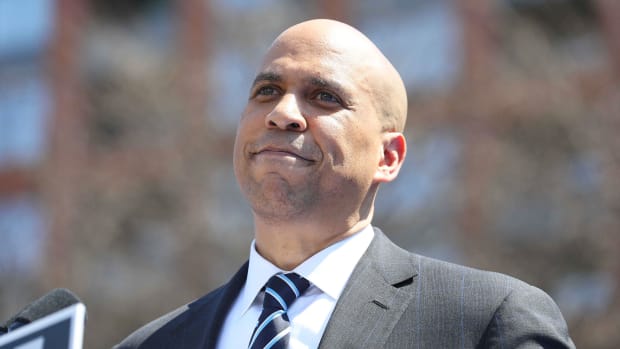Two U.S. senators at the center of the college athlete compensation debate on Capitol Hill are reintroducing a sweeping bill that would give college players the right to transfer an unlimited amount, return to school after entering a professional draft and access to lifetime scholarships.
Cory Booker (D-N.J.), Richard Blumenthal (D-Conn.) and three other Democratic senators are filing the newest version of the 2020 College Athlete Bill of Rights this week in Congress. Their office released an early copy of the bill to Sports Illustrated as well as a summary.
The bill is substantively identical to the version that was introduced in December of 2020 except that it does not feature a revenue-sharing concept. However, Booker plans to introduce a separate, standalone bill regarding revenue sharing, a Booker staff member says.
The reintroduction of the College Athlete Bill of Rights comes at a time of seismic change within college athletics, as name, image and likeness (NIL) enters its second year. The 2022 version of the bill provides athletes with little-to-no restrictions on NIL deals and allows for group licensing. In the only real limitation for athletes, states and schools can prohibit endorsement contracts with entities from particular industries, such as alcohol and drug companies, as long as the same restriction applies to the school or if the deal violates rules that all students are subject to. Schools are prohibited from arranging NIL deals for athletes, the bill says.

Chris Pedota/USA TODAY NETWORK
Sens. Brian Schatz (D-Hawai’i), Ron Wyden (D-Ore.) and Alex Padilla (D-Ca.) are other sponsors of a bill that, for now, does not include any Republican support. College athletes rights and NIL have evolved into a partisan topic on Capitol Hill. Since 2019, at least eight such bills have been introduced in Congress and none have advanced to even the first step in the legislative process despite more than a half-dozen hearings on the topic.
While the removal of the revenue-sharing provision makes Booker’s bill more digestible for Republicans, the bill is broad in scope and does not include antitrust protections for the NCAA. In the past, Republicans have supported a more narrow bill that gives NCAA protections.
“Being a college football player opened so many doors for me and provided me with invaluable skills that I still use to this day,” Booker, who played tight end at Stanford, said in a statement. “At the same time, I also saw the injustices that college athletes experience as the NCAA exploits them for financial gain, and woefully fails to protect their health, well-being, and safety—especially Black athletes, who are over-represented in revenue-generating sports.
“The time has come for change—and this bill moves us closer to doing right by and for college athletes.”
The Bill of Rights encompasses sections about health and safety, scholarships, school accountability and gender equity. It charges the Secretary of Healthy and Human Services to develop health and safety standards. The bill also creates a medical trust fund to cover costs of out-of-pocket medical expenses for athletes to use up to five years after their eligibility expires and requires those schools with a $50 million-or-more budget to finance athlete medical costs and medical insurance for at least four years after graduation.
Long-term athlete healthcare was a primary sticking point last summer, when the two sides came the closest to a compromise. Sen. Maria Cantwell (D-Wash.), the chair of the powerful Senate Commerce Committee, and Sen. Roger Wicker (R-Miss.) worked on bipartisan legislation that ultimately failed, most notably because of language regarding post-graduate healthcare benefits.
Book and Blumenthal’s bill allows athletes the freedom to transfer an unlimited amount of times without sitting a year out, a right the NCAA currently grants to athletes only one time. Athletes would be required to give seven days notice and cannot transfer during the season or 45 days preceding the start of the season.
According to the bill, athletes can enter a pro draft and return to school if they did not receive compensation and if they notify the athletic director within seven days of being drafted. The bill requires schools to provide athletes with scholarships until they complete their undergraduate studies, something often referred to as a “lifetime scholarship.”
The bill establishes a nine-member regulatory commission to ensure schools and conferences are following the law. The commission, which must include at least five former athletes, will be charged with enforcement. The bill also requires schools to provide annual public reporting of their total revenues and expenditures, including compensation for athletic department personnel and booster donations as well as reporting on the number of hours athletes commit to athletic activities.
The announcement Wednesday comes on the same day that former football coach-turned senator Tommy Tuberville (R-Ala.) told SI that he and Sen. Joe Manchin (D-W.Va) are in the process of acquiring feedback with intent to draft an NIL bill of their own.







